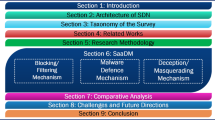Abstract
The SDI technology initiative, which is directed towards military ends, and its civil counterpart Eureka pose a challenge to relations between East and West and within the Western world. Professor Rolf Hasse analyses their implications for security and competition.
Similar content being viewed by others
ReferencesReferences
Cf. E. Staudt: Der technologische Aktivismus in der Bundesrepublik, in: Wirtschaftsdienst, No. 9, 1985, pp. 464–470.
Joseph A. Schumpeter: Kapitalismus, Sozialismus und Demokratie, 2nd edition, Berne 1950, pp. 218 and 226 ff.
Cf. inter alia the memorandum from the French Government to the Council of the European Communities of 12th September 1983 on the common industrial and research policy, reproduced in: Europa-Archiv, No. 24/1983, D 695–701; M. Richonnier: Europe’s Decline is not Irreversible, in: Journal of Common Market Studies, Vol. XXII, 1984, pp. 227 ff.; cf. also J. Rallo: The European Communities Industrial Policy Revisited: The Case of Aerospace, in: Journal of Common Market Studies, Vol. XXII, 1984, pp. 245 ff.
Cf. K. Seitz: SDI—die technologische Herausforderung für Europa, in: Europa-Archiv, No. 13/1985, especially p. 386; cf. also K. Broichhausen: Den Technologie-Protektionismus abwehren, in: Frankfurter Allgemeine Zeitung, 13th August 1984; M. B. Wallenstein: Scientific Communication and National Security in 1984, in: Science, Vol. 224, 4th May 1984, pp. 460 ff.
Cf. Karl M. Meesen: Extraterritoriality of Export Control: A German Lawyer’s Analysis of the Pipe-Line Case, in: German Yearbook of International Law, Vol. 278/1984, pp. 97 ff.; cf. also Douglas E. Rosenthal, William M. Knighton: National Laws and International Commerce. The Problem of Extraterritoriality, Chatham House Papers, Vol. 17, London 1982, pp. 53 ff.
Stiftung Wissenschaft und Politik: Die Ost-West-Wirtschaftsbeziehungen als deutsch-amerikanisches Problem, Ebenhausen 1983, pp. 97 ff.
Cf. Claus D. Kernig: Osthandel, Technologietransfer und Sicherheit—Überlegungen zur westlichen Fehleinschätzung des Technologietransfers in die UdSSR, in: W. Link (ed.): Die neueren Entwicklungen des Ost-West-Konflikts, Cologne 1984, pp. 53 f.
See the individual analyses by J. Nötzold, W. Beitel, F. Müller, H.-D. Jacobsen and K. Schröder and the conclusions by C. Royen in the collection of essays by F. Müller et al.: Wirtschaftssanktionen im Ost-West-Verhältnis. Rahmenbedingungen und Modalitäten, Baden-Baden 1983, pp. 155 ff.; cf. also the theoretical analyses in R. Hasse: Theorie und Politik des Embargos, Cologne 1973, pp. 325 ff.
Cf. R. Hasse, op. cit. Theorie und Politik des Embargos, Cologne 1973, pp. 135–324; S. Woolcock: Western Policies on East-West Trade, Chatham House Papers, Vol. 15, London 1982, passim.
Cf. R. Hasse, op. cit. Theorie und Politik des Embargos, Cologne 1973, pp. 45–56.
Cf. inter alia P. Wiles: On the Prevention of Technology Transfer, in: East-West Technological Co-operation, NATO Colloquium, Munich 1976, Brussels 1977, pp. 25 ff.
Cf. L. Gouré: Soviet Views on Détente and Military Power, Center for Advanced International Studies, University of Miami, Coral Gables 1975, passim.
Cf. inter alla Bruce Parrott (ed.): Trade, Technology and Soviet-American Relations, Bloomington 1985; T. Gustafson: Selling the Russians the Rope? Soviet Technology Policy and U.S. Export Controls, Santa Monica 1981; P. Hanson: Trade and Technology in Soviet-Western Relations, London and Basingstoke 1981; J. Tuck: Die Computer-Spione. Der heimliche Handel mit NATO-Technologie, Munich 1984; L. Melvern, D. Hebditch, N. Anning: Techno-Bandits—How the Soviets are Stealing America’s High-Tech Future, Boston 1984.
Claus D. Kernig, op. cit. Osthandel, Technologietransfer und Sicherheit—Überlegungen zur westlichen Fehleinschätzung des Technologietransfers in die UdSSR, in: W. Link (ed.): Die neueren Entwicklungen des Ost-West-Konflikts, Cologne 1984, p. 52.
Cf. C. Wörmann: Der Osthandel der Bundesrepublik Deutschland. Politische Rahmenbedingungen und ökonomische Bedeutung, Frankfurt and New York 1982, passim.
Cf. R. Hasse: Was ist normaler Osthandel? in: Wirtschaftsdienst. No. 3, 1980. pp. 115 ff.
Cf. H. Kissinger: The White House Years, London 1979, pp. 150–155; William G. Hyland: Soviet-American Relations: A New Cold War?. The Rand Corporation (R-2763-FF/RG), pp. 21 ff.; G. Schweigler: Interessen und Ziele der amerikanischen Politik gegenüber der Sowjetunion, in: F. Müller et al., op. cit. Wirtschaftssanktionen im Ost-West-Verhältnis. Rahmenbedingungen und Modalitäten, Baden-Baden 1983, pp. 25–54.
Defense Science Board Task Force on Export of U. S. Technology: An Analysis of Export Control of U. S. Technology: A DoD Perspective, Department of Defense, Office of the Director of Defense Research and Engineering, Washington D.C., 1976 (the Bucy Report).
Cf. Stephan A. Merrill (ed.): Securing Technological Advantage: Balancing Export Controls and Innovation, Center for Strategic and International Studies, Georgetown University, Washington D.C., summer 1985, passim.
Cf. H.-D. Jacobsen: Die Osthandelspolitik des Westens: Konsens und Konflikt, in: supplement to the weekly newspaper “Das Parlament”, B 5/85, 2nd February 1985, p. 22.
Cf. H.-D. Jacobsen: Die Osthandelspolitik des Westens, op. cit. Konsens und Konflikt, in: supplement to the weekly newspaper “Das Parlament”, B 5/85, 2nd February 1985, p. 22–26.
Cf. J. Tuck, op. cit. Die Computer-Spione. Der heimliche Handel mit NATO-Technologie, Munich 1984, pp. 78 ff. and passim.
Cf. R. Hasse: Theorie und Politik des Embargos, op. cit., Cologne 1973, pp. 105–134. For this reason the Export Administration Act of 1979 rightly distinguishes between “national security” and “foreign policy”.
Cf. inter alia S. Woolcock, op. cit. Western Policies on East-West Trade, Chatham House Papers, Vol. 15, London 1982, passim. pp. 41 ff.
Cf. inter alia Stephen A. Merrill (ed.), op. cit., passim.
Author information
Authors and Affiliations
Rights and permissions
About this article
Cite this article
Hasse, R. Technologies of the future: Security and competition aspects. Intereconomics 21, 68–74 (1986). https://doi.org/10.1007/BF02925344
Issue Date:
DOI: https://doi.org/10.1007/BF02925344




